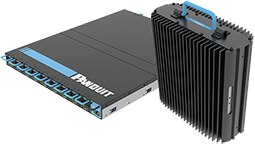 Power distribution technology has undergone major improvements over the last few years, from the introduction of lithium-ion batteries to the incorporation of remote management capabilities. Notably, the introduction of Class 4 power in the 2023 National Electrical Code has opened up some incredible new possibilities for power distribution solutions. Class 4 power expands the capabilities of power distribution beyond the limitations of Class 1 and Class 2 circuits, enabling solutions like Panduit's new Fault Managed Power System (FMPS). Panduit's FMPS is the first Class 4 system to integrate efficiency with advanced safety features within the power distribution solution.
Power distribution technology has undergone major improvements over the last few years, from the introduction of lithium-ion batteries to the incorporation of remote management capabilities. Notably, the introduction of Class 4 power in the 2023 National Electrical Code has opened up some incredible new possibilities for power distribution solutions. Class 4 power expands the capabilities of power distribution beyond the limitations of Class 1 and Class 2 circuits, enabling solutions like Panduit's new Fault Managed Power System (FMPS). Panduit's FMPS is the first Class 4 system to integrate efficiency with advanced safety features within the power distribution solution.
What is Class 4?
In order for Panduit's solution to obtain the Class 4 listing under the 2023 code, Panduit needed to certify to UL 1400-1 standard for Fault Managed Power Systems. Earning this certification meant passing over 500 rigorous tests to ensure the following:
- Functional Safety to make sure the system failed safely in case of malfunction
- Electric Shock to ensure human contact with wires would not result in severe electric shock
- Fire Safety to asses the system's ability to prevent fire in fault conditions
- Product Safety to ensure safe installation and operation
- Product Immunity to measure robustness against external disturbances
- Manufacturing Testing to confirm that the manufacturing process produces products that meet all safety tests
Class 4 power solutions must successfully pass these tests. All of these tests - and more - were designed to not only obtain the Class 4 power listing, but to also ensure that Panduit's new solution is safe and efficient in use.
Class 4 vs. Class 1 and Class 2
You may be more familiar with Class 1 or Class 2 circuits and how they work, so let's compare Panduit's Class 4 FMPS to these systems. Class 1 does not offer fault protection, and it requires isolation in conduit. Class 2, also known as power-limited circuits, are restricted to 100W and 60V from a Class 2 source. Panduit's Class 4 FMPS has no such limitations. In fact, it offers real-time fault detection, ensuring a higher level of protection against electric shock and fire hazards. No isolation in conduit needed! It also, of course, can deliver higher power than Class 2 circuits; notably, though, it still uses the low voltage installation practices of a Class 2 circuit, making it easier and more cost-efficient to install.
Panduit's Class 4 FMPS
Fault management technology enables Panduit's FMPS to support safe and efficient power delivery to remote devices across extensive distances. This makes Panduit's FMPS especially well-suited for edge applications and Power over Ethernet (PoE) support. You can even think of Panduit's FMPS as a sort of safe and flexible extension cord, bringing power to applications at further distances.
How does it do that? Well, Panduit's Class 4 FMPS offers a centralized power architecture. This approach means that a single UPS can support the backup of several devices, simplifying your power management strategy and enabling more efficient additions when needed. With remote monitoring and control capabilities, you can troubleshoot issues, monitor consumption, and analyze usage from anywhere, making it incredibly easy to keep tabs on your system.
To learn more about Panduit's power solutions, reach out to your local Accu-Tech representative here.


.png?width=58&height=58&name=X_logo_2023_(white).png)
